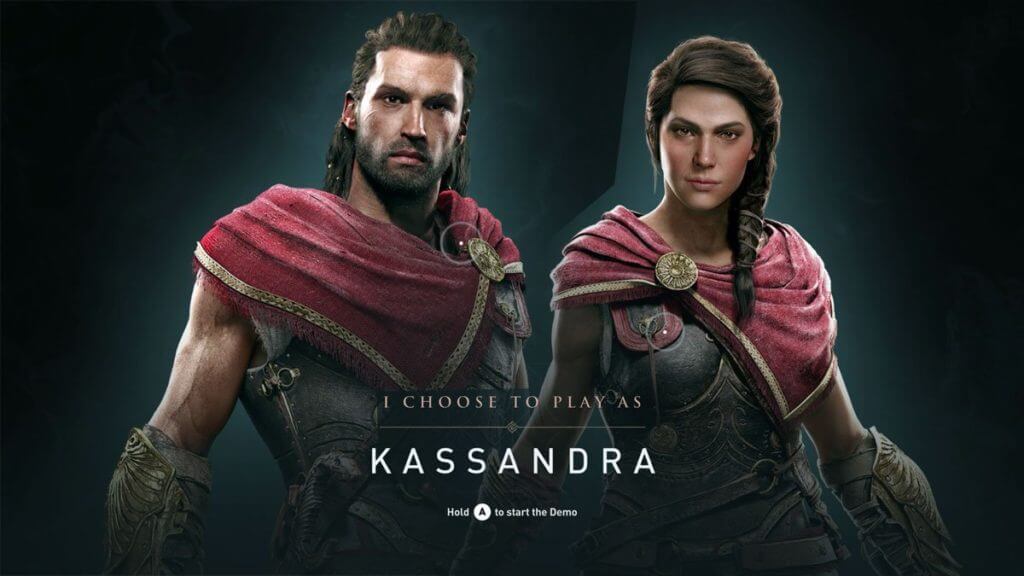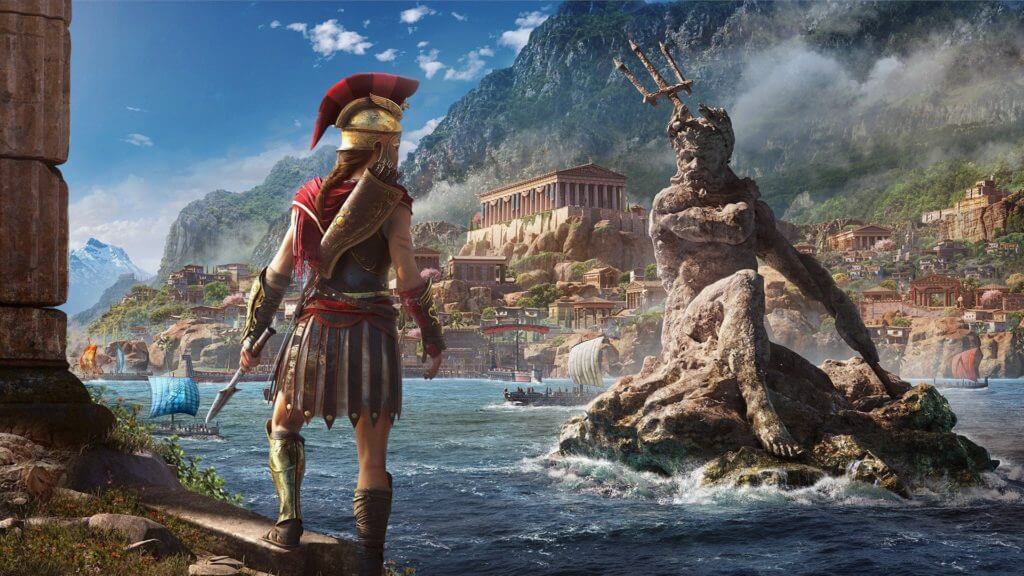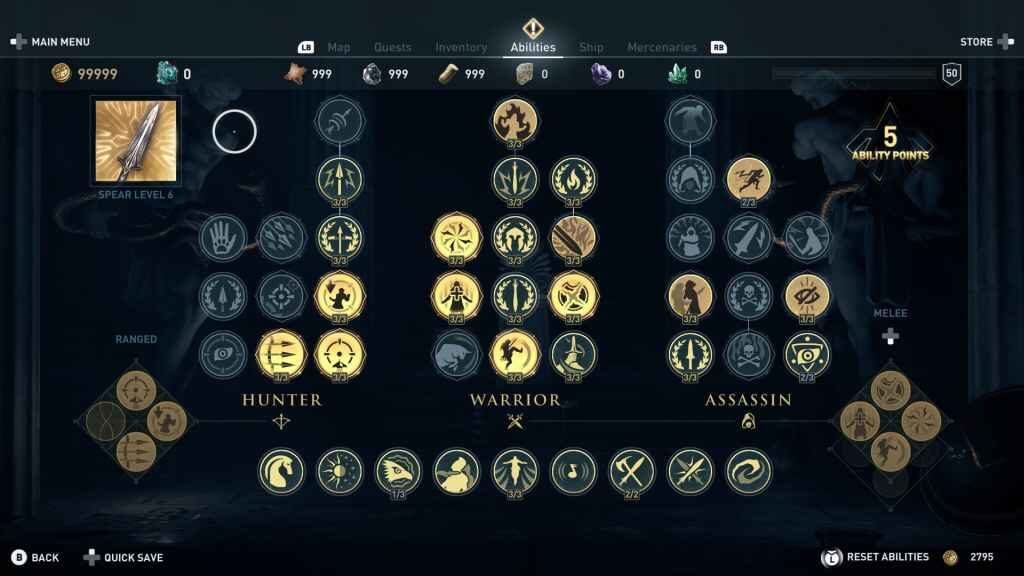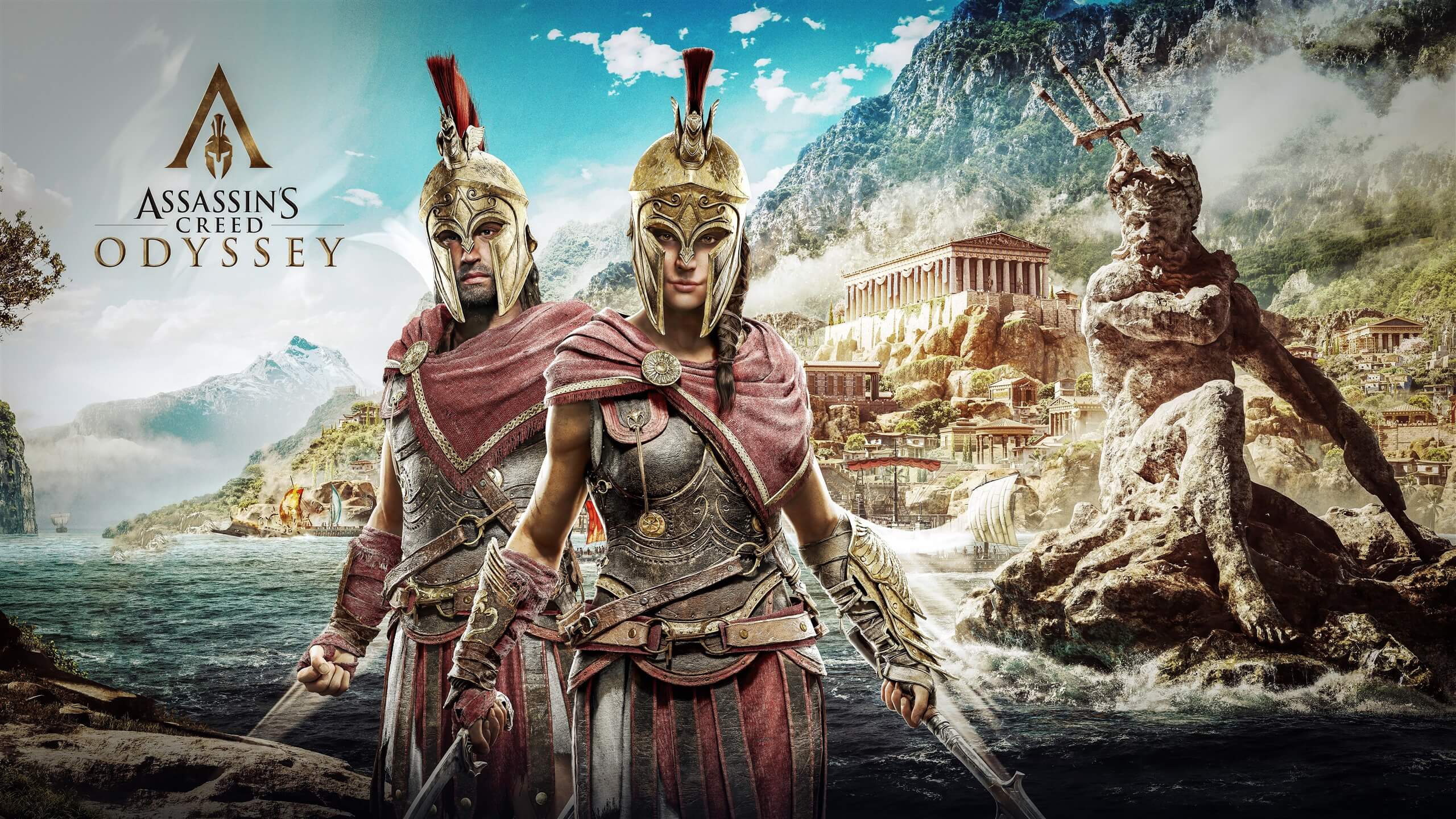REVIEW: Assassin’s Creed: Odyssey (2018)
For what felt like the longest time, I was a die-hard fan of Ubisoft’s sandbox action-adventure game series, Assassin’s Creed. Their blend of exploration-focused gameplay with enticing stealth and battle mechanics were an instant hit for the type of gaming experience that I was looking for. Unfortunately, as befalls many a publisher these days, sales were too good too soon, and Ubisoft quickly and obviously viewed the franchise as little more than a cash cow, making the fall release an annual event – one which saw declining quality from both a narrative and overall gameplay polish perspective. I haven’t been fully invested in an Assassin’s Creed entry since the tale of Ezio Auditore da Firenze wrapped up in Assassin’s Creed: Revelations. Beginning with each release following that trio of Italian-assassin-centered tales, I became noticeably detached from the series. I played the others (admittedly, I could not bring myself to finish Unity because I have respect for myself as a gamer). It had become clear: the annual deadline brought with it a visibly and viscerally offensive drop in quality, and with expectations of churning out a game as large as the series was typically known for, while writing a compelling narrative and giving the quality assurance testers adequate time with the game, it shouldn’t be any wonder why the once great Brotherhood had fallen so far from grace. The series took a step in the right direction by taking a beat and skipping over a 2016 release in between Syndicate and Origins to marked improvement. That spark was enough to rekindle the excitement within fans (myself included) and, therefore, Ubisoft; the result is Assassin’s Creed: Odyssey.
Assassin’s Creed: Odyssey attempts to capitalize on the resounding success of last year’s Assassin’s Creed: Origin, and the ancient Greece setting is more than enticing for this ancient mythology fan. However, over the course of my time with the cast-out Spartan Kassandra, I couldn’t help but wonder if the developers could have used some more time with the project. The basic premise is a strong hook: you are a sword for hire, a misthios (mercenary in Greek) who once belonged to a Spartan family, during the Peloponnesian War between Sparta and Athens, who was cast out after attempting to save your infant sibling, who was to be tossed away as cursed refuse by the leaders of your people. Your own father is ordered to kill you as recompense for your interference with the deed, and you end up tumbling over a cliff to your assumed demise. Your “death” is short-lived, however, and you make your way to a small boat and sail out into the open sea. You’re tossed about like a rag doll until you wash up on shore on the island of Kephallonia, where you are discovered by a drunken, shiftless con named Markos. Markos takes you into his “care,” providing shelter and food at the price of you becoming his errand boy or girl. The story does not change depending on who you choose to play as between the siblings, Alexios and Kassandra; in fact, you can make all of the same decisions, including romance the exact same NPC characters.

Assassin’s Creed: Odyssey continues the hit-box-style combat introduced in its predecessor, Origins, and while it is fun overall and it’s nice to not be forced to target a single enemy at a time, the movements still feel unnatural. The combat is augmented by the wide variety of weapon types that you may choose from for your enemy head-bashing pleasure. From Greek style short swords to spears and hammers, there’s no shortage of options with which to send your enemies straight to Hades. These weapons can be upgraded alongside you as you level up throughout the game; however, bear in mind that it is quite costly to do so and resources for upgrading your weapons and armor – as well as those required for adding any one of the various Engravings to further augment their attributes – are not in abundance whatsoever. Further aggravating this is that fact that the rate with which you level up naturally just slightly outpaces the frequency with which you acquire the aforementioned resources. I cannot tell you how many times I had at last collected the requisite resources for upgrading my favorite Legendary class weapon or armor just to realize that I had also leveled up from the very same quest that rewarded me with said resources, forcing me to continue my hunt for them yet again as the cost for upgrading my gear to my newly attained level became markedly more costly. I am not so much a hard-liner when it comes to the dreaded loot crates in video games, provided that they’re primarily for aesthetics and not for progression, but Assassin’s Creed: Odyssey expounds upon the credits system introduced in Origin. Should you find yourself annoyed (as I was) with persistently being short-changed with resources, you can always cough up some real-world cash in exchange for Helix Credits for use in the in-game store and then purchase any one of several resource packs from there. In fact, you can also purchase permanent modifiers to your EXP and Drachmae (Greek currency until 2002, when it was replaced by the euro) gains – x1.5 modifiers to be precise. If this sounds like a pay-to-win scheme to you, then well, you’re not crazy – let’s just say that. I personally refused to purchase these and chose instead to use what few Helix Credits I had in my possession for something more pleasing to the eyes such as a Pegasus (c’mon, who doesn’t want a horse with wings?). Every piece of both weapons and armor belongs to one of the following rarity classifications: Common, Rare, Epic, and Legendary and can all be dismantled into resources to be used in upgrading the pieces you want to hang onto, but this only makes the upgrading process minutely less grindy.
How’s the narrative? Well, as with virtually all prior entries in the franchise, the present day plot of Assassin’s Creed: Odyssey is forgettable at its best and unnecessary at its worst. The actual narrative that you play through, as either Alexios or Kassandra, is actually quite good and entertaining. It certainly helped for me that I have studied Greek history and mythology fairly heavily, and my admiration for such certainly contributed to that. You have some control over the final outcome of the story and its characters based on a combination of the many choices that you can make over the course of the game. In total, there are nine endings, some with more differentiation than others, but the overall experience doesn’t stray too far off a general path (think less Witcher III and more Mass Effect 3). The tale definitely tries to take nods from the likes of Homer, and it’s really no wonder that the game has “Odyssey” in its title, as there are a number of parallels to the Greek storyteller’s epic. From the time that you learn of your character’s tragic past, you are invested in their quest and want to see all made right again. However, herein lies the issue: the characters are mostly one-dimensional. I say this with a bit of a caveat, as my personal favorite (and best by a long mile) protagonist in the series is Ezio Auditore, who was one of the more dynamic characters in not just the Assassin’s Creed franchise, but in gaming in general. When standing next to snooze-fests like Connor or Arno, Alexios and Kassandra don’t seem so bad, and they have their fair share of great lines, but their progression arc is less an arc and more a straight line that wiggles a little bit here and there. The voice acting, on the other hand, is solid, so no knock to the voice actors – the writers just didn’t make their characters grow enough for me.

A highlight of the series has always been the soundtrack, and the team of Joe Henson and Alexis Smith’s The Flight bring with them a musical backdrop worthy of an epic tale. The tracks fit in perfectly with the Mediterranean setting of Assassin’s Creed: Odyssey and add a level of submersion that wouldn’t be present otherwise. Sea shanties also make a return, being one of the more endearing features in Assassin’s Creed IV: Black Flag, and the ability to swap out your sailing crew member adds different voices to the ensemble as well. Having a history with ensemble groups myself, I thoroughly enjoyed the harmonization of my crew, male or female, when sailing from one locale to another. The shanties are incredibly catchy and entertaining (now we just need some Irish drinking songs in a future installment) and make long journeys from one peninsula to another far less droning. If you’ve enjoyed the sailing in previous entries, then you won’t be disappointed here, as it’s more or less unchanged (swap out cannons for spears and arrows and you’ve got Odyssey’s sailing and ship combat). I’ve never personally been overly fond of the ship combat in Assassin’s Creed, but what I do enjoy is boarding other ships and swiping them for all the loot that they’re good for, as well as diving down to other wreckage and retrieving whatever treasures may lay beneath the waves. Dealing with creatures of the deep is another matter entirely, and to say that I do not enjoy encountering the sharks roaming many of the game’s waters is a gross understatement.
The leveling system in Assassin’s Creed: Odyssey, while I find it to be absurdly unbalanced in its pacing with your resource collecting, is, for its part, enjoyable. Being able to choose assignable abilities from the different skill trees for a more tailored combat experience is something that I quite appreciate. There are three skill trees from which you may unlock and map your skills. The Hunter tree’s aim is to enhance your proficiency with your bow by adding the ability to target multiple enemies at once, charge up your shots for a more damaging arrow, and slow time temporarily for more reaction time when spotted by enemies. Warrior is just like it sounds, and its goal is focused heavily on your melee combat skills, adding a charging Bull Rush attack, charged heavy melee attack, and the ability to break through enemy shields with your blows. Of course, the only skill that should matter is the Sparta Kick (yes, they literally called it that; God bless Zack Snyder). The Assassin tree is all about being crafty and as calculating as possible by adding poison augmentations to your weapons, a flashbangesque skill to disorient your foes, and a number of a single strike, insta-kill techniques for more traditional assassinations. You may only map up to four active skills to your Ranged or Melee ability loadouts, so you are given some limitations here, but I didn’t really find these debilitating.

The game in Assassin’s Creed: Odyssey also has a Mercenaries system that reminds me a lot of the general’s contracts in the Middle Earth: Shadows of Mordor/War games, with you working your way up the ranks of the world’s best mercenaries from the bottom of the barrel to the top of the mountain. There are nine tiers of mercenaries, with each foe dropping rare or powerful gear and other resources. The benefits go beyond the drops too, as upon completion of a given tier you also will receive new passive bonuses such as discounts at shops or increased rewards for completing bounties. Many of these mercenaries are measurably more powerful than the other enemies that you face throughout your adventures, and the game thankfully notates the level of each enemy and recommends that you not square-off against those that are more than a level or two higher than your own, lest you get your rear-end decidedly handed to you on a pike. There’s a host of other side quests to partake in as well if you desire to wander off the beaten path. Most of these are fairly rewarding with EXP and other items such as rare gear, and finding things to do on the in-game world map is a breeze with the use of the filters and a little exploration legwork.
Assassin’s Creed is a franchise that has changed drastically through the years, with the removal of the counter mechanics and addition of more robust RPG traits, as well as the inclusion of decision making and romance options. In Assassin’s Creed: Odyssey, some of these things enhance the gameplay experience by allowing for more tailored combat, and others take away by coming off as afterthoughts. You really want to tell me that out of the dozen romance options in this world, every single one of them swings both ways? C’mon Ubisoft, humans don’t work that way, and it feels forced; Mass Effect and Dragon Age, for all their other faults, did this far better. Stick with what you’re good at. Something that hasn’t changed, unfortunately, for the series is the standard fare of glitches and out of sync facial recognition. Admittedly, the latter could be far worse (hi, Mass Effect Andromeda), but the former just gets old; I wasn’t fifteen minutes into my playthrough when, while attempting to reach Markos at his villa, my game slowed to a crawl like it was a YouTube video from 2007 attempting to buffer its way to functionality. Common throughout the game beyond that was shaky object holding by characters and awkward and unrealistic gripping of items. This is 2018 right? We should know how to do these things by now, Ubisoft. The spotty animation issues aside, the world itself is beautiful and lush, with plant and animal life feeling like it was placed naturally and old ruins of temples appearing as though they were straight from the history books. Sailing is absolutely breathtaking, and the overall character models, despite some inconsistencies with the mouth movements to the voice acting work, are well done too.
I can’t say that I hated Assassin’s Creed: Odyssey; the ancient Greek setting with the right amount of homage to tragedies and the old mythologies in the recipe make for an interesting world that feels full of life. But I can’t say that I loved it either; the lack of a strong and dynamic character arc, mixed with afterthought romance side plots, the usual Assassin’s Creed franchise graphical issues that longtime players have become unfortunately accustomed to, and a frustratingly grindy upgrade system that would make even Destiny players thank their lucky stars, hold this game back. Assassin’s Creed: Odyssey was a massive undertaking, and the scope of the game world is a testament to the ambition of the development team, but the game lacks the polish that it needs to truly shine instead of having a more matte finish.
Assassin's Creed: Odyssey
Gameplay - 8
Difficulty - 8
Story - 7.5
Graphics - 8.5
Sound - 9.5
8.3
Good
Odyssey was a massive undertaking and the scope of the game world is a testament to the ambition of the development team, but the game lacks the polish that it needs to truly shine instead of having a more matte finish.
Comments (2)


That’s a fair criticism, even if I didn’t personally feel like I had ever fallen behind in the progression. I do hope that they move away from the microtransactions in the future. It has no place in an Assasin’s Creed game. Thanks for taking the time to read my review!








I finished the game, and to be honest, I would give it a 6.5,
my biggest complaint is the XP shortchange, you have to do everything or you simply fall behind on the level demands for the next area. In the witcher 3 (probably my favorite game and measuring stick for all AAA games for now), a good player could tackle an enemy that was stronger than him and still win (from experience, its hell but the rewording feeling of biting an enemy that was marked with a skull and getting some great loot that was usually not gated for 10 levels ahead was insane) in this game an enemy with 3 more levels than you could kill you in a 3 strick combo, it’s insane!
yes, Graphics were great, the sound and voice acting was good, the story was OK but the Pay to win manipulation was horrible, it was either pay or a time sink (thank you Corona I guess)
*I wouldn’t recommend unless you are a completionist at heart and soul